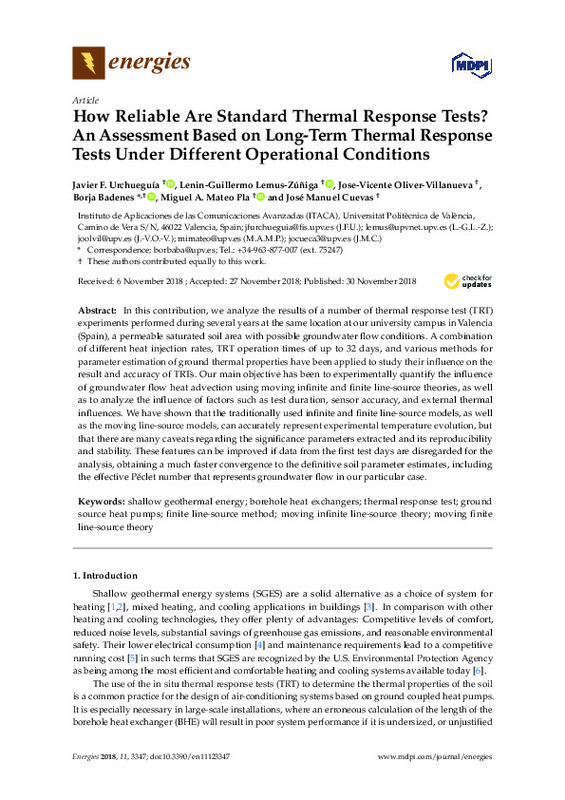JavaScript is disabled for your browser. Some features of this site may not work without it.
Buscar en RiuNet
Listar
Mi cuenta
Estadísticas
Ayuda RiuNet
Admin. UPV
How Reliable Are Standard Thermal Response Tests? An Assessment Based on Long-TermThermal Response Tests Under Different Operational Conditions
Mostrar el registro sencillo del ítem
Ficheros en el ítem
| dc.contributor.author | Urchueguía Schölzel, Javier Fermín
|
es_ES |
| dc.contributor.author | Lemus Zúñiga, Lenin Guillermo
|
es_ES |
| dc.contributor.author | Oliver Villanueva, José Vicente
|
es_ES |
| dc.contributor.author | Badenes Badenes, Borja
|
es_ES |
| dc.contributor.author | Mateo Pla, Miguel Ángel
|
es_ES |
| dc.contributor.author | Cuevas-Castell, José Manuel
|
es_ES |
| dc.date.accessioned | 2019-05-31T20:43:06Z | |
| dc.date.available | 2019-05-31T20:43:06Z | |
| dc.date.issued | 2018 | es_ES |
| dc.identifier.uri | http://hdl.handle.net/10251/121359 | |
| dc.description.abstract | [EN] In this contribution, we analyze the results of a number of thermal response test (TRT) experiments performed during several years at the same location at our university campus in Valencia (Spain), a permeable saturated soil area with possible groundwater flow conditions. A combination of different heat injection rates, TRT operation times of up to 32 days, and various methods for parameter estimation of ground thermal properties have been applied to study their influence on the result and accuracy of TRTs. Our main objective has been to experimentally quantify the influence of groundwater flow heat advection using moving infinite and finite line-source theories, as well as to analyze the influence of factors such as test duration, sensor accuracy, and external thermal influences. We have shown that the traditionally used infinite and finite line-source models, as well as the moving line-source models, can accurately represent experimental temperature evolution, but that there are many caveats regarding the significance parameters extracted and its reproducibility and stability. These features can be improved if data from the first test days are disregarded for the analysis, obtaining a much faster convergence to the definitive soil parameter estimates, including the effective Peclet number that represents groundwater flow in our particular case. | es_ES |
| dc.description.sponsorship | This research was funded by the European Union's Horizon 2020 Research and Innovation program under grant agreement No [657982] and [727583]. | es_ES |
| dc.language | Inglés | es_ES |
| dc.publisher | MDPI AG | es_ES |
| dc.relation.ispartof | Energies | es_ES |
| dc.rights | Reconocimiento (by) | es_ES |
| dc.subject | Shallow geothermal energy | es_ES |
| dc.subject | Borehole heat exchangers | es_ES |
| dc.subject | Thermal response test | es_ES |
| dc.subject | Ground source heat pumps | es_ES |
| dc.subject | Finite line-source method | es_ES |
| dc.subject | Moving infinite line-source theory | es_ES |
| dc.subject | Moving finite line-source theory | es_ES |
| dc.subject.classification | INGENIERIA AGROFORESTAL | es_ES |
| dc.subject.classification | FISICA APLICADA | es_ES |
| dc.subject.classification | ARQUITECTURA Y TECNOLOGIA DE COMPUTADORES | es_ES |
| dc.subject.classification | MECANICA DE FLUIDOS | es_ES |
| dc.title | How Reliable Are Standard Thermal Response Tests? An Assessment Based on Long-TermThermal Response Tests Under Different Operational Conditions | es_ES |
| dc.type | Artículo | es_ES |
| dc.identifier.doi | 10.3390/en11123347 | es_ES |
| dc.relation.projectID | info:eu-repo/grantAgreement/EC/H2020/657982/EU/CHEAP AND EFFICIENT APPLICATION OF RELIABLE GROUND SOURCE HEAT EXCHANGERS AND PUMPS/ | es_ES |
| dc.relation.projectID | info:eu-repo/grantAgreement/EC/H2020/727583/EU/Advanced materials and processes to improve performance and cost-efficiency of Shallow Geothermal systems and Underground Thermal Storage/ | es_ES |
| dc.rights.accessRights | Abierto | es_ES |
| dc.contributor.affiliation | Universitat Politècnica de València. Departamento de Física Aplicada - Departament de Física Aplicada | es_ES |
| dc.contributor.affiliation | Universitat Politècnica de València. Departamento de Informática de Sistemas y Computadores - Departament d'Informàtica de Sistemes i Computadors | es_ES |
| dc.contributor.affiliation | Universitat Politècnica de València. Departamento de Ingeniería Rural y Agroalimentaria - Departament d'Enginyeria Rural i Agroalimentària | es_ES |
| dc.contributor.affiliation | Universitat Politècnica de València. Departamento de Ingeniería Hidráulica y Medio Ambiente - Departament d'Enginyeria Hidràulica i Medi Ambient | es_ES |
| dc.description.bibliographicCitation | Urchueguía Schölzel, JF.; Lemus Zúñiga, LG.; Oliver Villanueva, JV.; Badenes Badenes, B.; Mateo Pla, MÁ.; Cuevas-Castell, JM. (2018). How Reliable Are Standard Thermal Response Tests? An Assessment Based on Long-TermThermal Response Tests Under Different Operational Conditions. Energies. 11(12). https://doi.org/10.3390/en11123347 | es_ES |
| dc.description.accrualMethod | S | es_ES |
| dc.relation.publisherversion | https://doi.org/10.3390/en11123347 | es_ES |
| dc.type.version | info:eu-repo/semantics/publishedVersion | es_ES |
| dc.description.volume | 11 | es_ES |
| dc.description.issue | 12 | es_ES |
| dc.identifier.eissn | 1996-1073 | es_ES |
| dc.relation.pasarela | S\374276 | es_ES |
| dc.contributor.funder | European Commission | es_ES |








